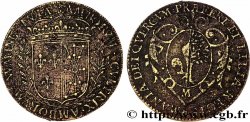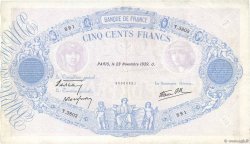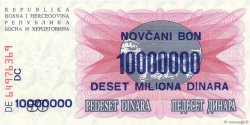E-auction 301-221042 - fjt_522188 - ILE DE FRANCE - TOWNS AND GENTRY Pierre-Antoine de Castagnère, marquis de Châteauneuf 1723
You must signin and be an approved bidder to bid, LOGIN TO BID. Accounts are subject to approval and the approval process takes place within 48 hours. Do not wait until the day a sale closes to register. Clicking on « bid » constitutes acceptance of the terms of use of cgb.fr private e-auctions.
Bids must be placed in whole Euro amounts only. The sale will start closing at the time stated on the item description; any bids received at the site after the closing time will not be executed. Transmission times may vary and bids could be rejected if you wait until the last second. For further information ckeck the E-auctions F.A.Q.
NO BUYER'S FEE.
NO BUYER'S FEE.
| Estimate : | 28 € |
| Price : | 21 € |
| Maximum bid : | 25 € |
| End of the sale : | 21 January 2019 18:10:00 |
| bidders : | 9 bidders |
Type : Pierre-Antoine de Castagnère, marquis de Châteauneuf
Date: 1723
Metal : silver
Diameter : 29,15 mm
Orientation dies : 6 h.
Edge : cannelée
Catalogue references :
Obverse
Obverse legend : DE. LA. PREVOTE. DE. MRE. P. A. DE. CASTAGNERE. MARQ. DE. CHATEAUNEUF. CER. DETAT.
Obverse description : Armes de P. de Castagnère : écartelé au 1 : d'azur, au globe d'or croisé de même et cintré de gueules, au 2 : d'azur au lion d'or, à la fasce brochante de gueules chargée de trois roses d'argent, au 3 : de gueules à trois chevrons d'or, au 4 : palé d'argent et d'azur, au chevron de gueules brochant sur le tout. Sur le tout : d'or, au châtaignier arraché de sinople.
Reverse
Reverse legend : A L'EXERGUE : LA. VILLE. DE. PARIS. 1723.
Reverse description : Armes de Paris.
Commentary
Pierre-Antoine de Castagnère, marquis de Châteauneuf et de Marolles. Son élection donna lieu à quelques difficultés, attendu qu’il était né en Savoie, à Chambéry, et que les membres du Bureau de la Ville devaient être parisiens ; mais le roi, par lettre de cachet, ordonna de passer outre. A raison de son grand âge, M. de Châteauneuf ne fit que la première année de sa troisième prévôté. Reçu conseiller au Parlement le 10 mai 1675, il quitta la magistrature pour suivre la carrière diplomatique ; il fut ambassadeur à Constantinople en 1689, à Lisbonne en 1703, en Hollande en 1713 ; dans le courant du mois d’août 1719, il entra au Conseil d’État. Par lettres patentes de mars 1721, registrées au Parlement le 21 mars de l’année suivante, le roi donne à la Ville l’île des Cygnes pour y établir un atelier de déchirage des bateaux, ainsi qu’un port public pour les bois à brûler et à ouvrer.
La date donnée par Feuardent, 1721, n’est pas celle qui se lit sur le jeton.
Pierre-Antoine de Castagnère, Marquis of Châteauneuf and Marolles. His election gave rise to some difficulties, since he was born in Savoy, in Chambéry, and the members of the City Council had to be Parisians; but the king, by lettre de cachet, ordered that this be ignored. Due to his advanced age, M. de Châteauneuf only served the first year of his third provostship. Received as a councilor to the Parliament on May 10, 1675, he left the judiciary to pursue a diplomatic career; he was ambassador to Constantinople in 1689, to Lisbon in 1703, to Holland in 1713; during the month of August 1719, he entered the Council of State. By letters patent of March 1721, registered in Parliament on March 21 of the following year, the king gave the City the Île des Cygnes to establish a workshop for scrapping boats, as well as a public port for wood to be burned and worked. The date given by Feuardent, 1721, is not the one shown on the token.
La date donnée par Feuardent, 1721, n’est pas celle qui se lit sur le jeton.
Pierre-Antoine de Castagnère, Marquis of Châteauneuf and Marolles. His election gave rise to some difficulties, since he was born in Savoy, in Chambéry, and the members of the City Council had to be Parisians; but the king, by lettre de cachet, ordered that this be ignored. Due to his advanced age, M. de Châteauneuf only served the first year of his third provostship. Received as a councilor to the Parliament on May 10, 1675, he left the judiciary to pursue a diplomatic career; he was ambassador to Constantinople in 1689, to Lisbon in 1703, to Holland in 1713; during the month of August 1719, he entered the Council of State. By letters patent of March 1721, registered in Parliament on March 21 of the following year, the king gave the City the Île des Cygnes to establish a workshop for scrapping boats, as well as a public port for wood to be burned and worked. The date given by Feuardent, 1721, is not the one shown on the token.








 Report a mistake
Report a mistake Print the page
Print the page Share my selection
Share my selection Ask a question
Ask a question Consign / sell
Consign / sell
 Full data
Full data















